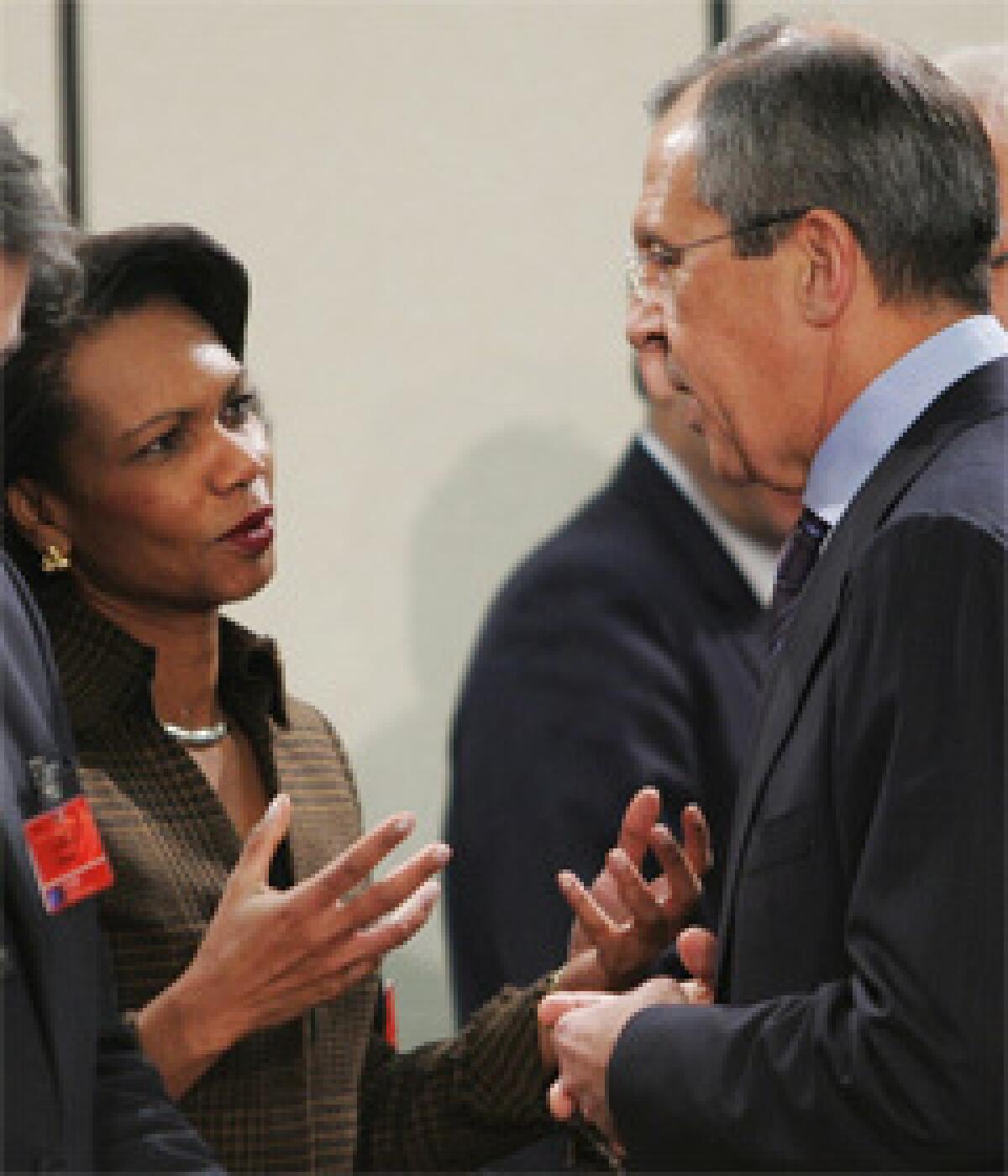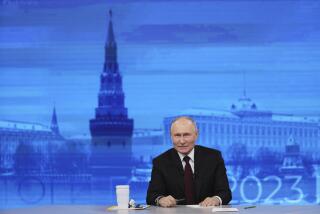A Cold War redux is seen on the horizon

Growing friction between the United States and Russia over Iran is only part of an increasingly difficult relationship that many diplomats and experts consider to be in its worst shape since the end of the Cold War, and at risk of further deterioration.
Although U.S. officials are publicly playing down the rising tension, a series of conflicts has prompted some within the Bush administration to conclude that, for domestic and geopolitical reasons, Russia is now more comfortable with the U.S. as an enemy than an ally.
The government of Russian President Vladimir V. Putin, flush with petrodollars and increasingly aggressive on foreign policy, has challenged the Bush administration on a wide range of issues just in the last few months. While U.S. officials badly need Russian help in the Middle East and elsewhere, Moscow has bucked Washington on Iran, Kosovo, missile defense, NATO expansion, arms treaties, and governance in its own country.
The acrimonious rhetoric between the two countries is likely to get louder, and some foreign diplomats and analysts fear that in places such as Kosovo and Georgia, the collision of interests could result in violence.
“The trajectory of the relationship has been steadily downward,” said Michael McFaul, a Stanford University political science professor and expert on post-Soviet countries. After peaking just after the Sept. 11 attacks, “it’s now the worst it’s been in 20 years.”
On Iran, the Russians at a gathering in Berlin last week resisted U.S. efforts to impose more painful sanctions against Tehran, forcing the Bush administration to settle for much less than what it had been seeking.
The meeting was dominated by wrangling between Russian Foreign Minister Sergei V. Lavrov and Secretary of State Condoleezza Rice, a specialist on Russian and Soviet affairs. It “was not always all that easy,” Germany’s foreign minister said afterward, describing the heated sessions with diplomatic understatement.
Underlying the mounting friction is Russia’s shift in the last few years from a country that once strove for full integration with the West to one that now seeks to serve as an independent power center that can check what it views as the excessive influence of the United States. Russian leaders calculate that opposing an unpopular Bush administration will consolidate their domestic position while helping them gain leadership status abroad.
Bush administration officials say that Russian leaders believe the United States exploited their weak post-Cold War position in the early 1990s.
The Russian view is, “ ‘We were weak, stabbed in the back, betrayed. But now we’re back -- we’re strong,’ ” said a senior administration official, speaking on condition of anonymity when discussing internal assessments.
“They seem to relish fighting with us and accusing us of various things,” said the administration official. “They like having an enemy.”
In the view of many Russians, the U.S. posture in the world has changed for the worse over the years, and now requires a different response.
“America now reminds me of a person who enters a bar with a gun in his hand and says, ‘Look, if you’re not tolerant enough, I’ll shoot you on the spot,’ ” said Mikhail G. Delyagin, the chairman of Moscow’s Institute of Globalization Studies. “They perceive any sign of dissent as a manifestation of aggression against themselves.”
Both sides have compared the other, at least obliquely, to Nazi Germany.
The complaint that the West took advantage of Russia’s weakness is reminiscent of grievances “with a bad history in the 20th century,” the senior Bush administration official said, referring to accusations made by the Nazis to build domestic support.
Putin laid down a tough line last February in Munich, Germany, when, without mentioning the United States by name, he complained of countries that were trying to expand their world power like the Nazis before World War II.
In public, top U.S. officials soft-pedal their conflicts with Russia, saying that they do not view Russia as an enemy, and pointing out that the two countries are working well on such issues as counter-terrorism and North Korea’s nuclear weapons program.
They dismiss a new debate among foreign policy experts about “Who lost Russia?” that follows the lines of the “Who lost China?” debate in the mid-20th century.
“The recent talk about a new Cold War is hyperbolic nonsense,” Rice insisted on Wednesday in a speech at the World Economic Forum in Davos, Switzerland.
“We don’t define ourselves against Russia,” Daniel Fried, the assistant secretary of State for Europe, said in an interview. “We’re not an enemy. We’re not out to weaken them.”
But friction has become clearly visible.
Last month, Russia began shipping nuclear fuel for Iran’s reactor at Bushehr, over U.S. objections. And Russia and China have forced a delay and dilution of the new round of U.N. sanctions against Iran sought by Washington.
On another issue, Russia has opposed proposals in the U.N. to give independence to the Serbian province of Kosovo. U.S. officials have indicated support for Kosovo’s separation, but Russia has backed Serbia, a move that some analysts fear could encourage Belgrade to take military action if Kosovo declares independence next month, as expected.
Russian officials have hinted that if the United States publicly supports an independent Kosovo, they would respond by declaring support for the independence of the breakaway province of Abkhazia, against the U.S.-allied Georgia. Such a move could lead to a military confrontation between Georgia and Abkhazia, where Russian peacekeeping troops are based.
Elsewhere, the Russian government has threatened retaliatory steps against Poland and the Czech Republic if they take part in the U.S. missile defense project in Eastern Europe. In the face of that pressure, the new Polish government is reconsidering its commitment.
Russia last year “suspended” its participation in the Conventional Forces in Europe Treaty, a Cold War-era pact aimed at limiting the deployment of conventional forces near the border regions. The move threw into doubt whether Moscow would stand by other arms control pacts.
Only this month, Russia appointed as envoy to NATO a nationalist gadfly, Dmitri Rogozin, who believes the Western coalition no longer has any legitimate purpose. The move was seen as a signal that Russia intends to oppose further North Atlantic Treaty Organization expansion, which Moscow views as a threat.
Russian analysts acknowledge that the Putin government is trying to exploit anti-Americanism for political purposes.
“It’s very popular and relatively easy to use anti-Western and anti-American feelings as a declared political position,” said Alexander Konovalov, president of Moscow’s Institute for Strategic Assessment. “But if the public were not oriented to anti-Americanism, Putin would never have made a speech like the one he made in Germany.”
Russian analysts argue that the United States bears as much or more responsibility for strained relations. The two countries have often clashed because of flawed foreign policy on the part of the United States, they say.
On Kosovo, for example, there is a widespread belief among Russians that America is underestimating how much the province’s independence would destabilize Europe. Many Russians also fear that the United States’ hard-line approach to Iran is counterproductive.
Moreover, Russia is deeply sensitive to U.S. involvement in former Soviet states such as Georgia, not to mention the missile defense plan. Analysts and officials talk about the sense, long felt by Russians, that they are being encroached upon by onetime adversaries.
“If Russia did the same thing in countries that border on the U.S.,” said Delyagin, the chairman of Moscow’s Institute of Globalization Studies, “I think the U.S. would go as far as declaring war on us.”
McFaul, of Stanford, said Russia, unlike its Soviet predecessor, does not have the ability to prevent the United States from reaching national security objectives in many areas. For the most part, it can be a “spoiler,” simply making goals much tougher to reach, he said.
But in a few cases, it has been able to override U.S. plans. In 2005, Russia successfully pressured the Uzbek government to close down a U.S. air base that was being used to supply the effort in Afghanistan. The U.S. had a “hard-core strategic interest in that base, and now we don’t have it,” McFaul said.
Conservatives within the Bush administration have periodically pushed for a harder line on Russia. In 2006, Vice President Dick Cheney delivered a speech in Vilnius, Lithuania, that accused Russia of backsliding on democracy and using its energy supply to gain unfair leverage over neighboring countries.
The speech was intended to draw a line not only for the Russians but also for Cheney’s more moderate rivals within the administration, said McFaul. Yet, there was never an overhaul of the administration’s Russia policy, he said.
The Bush administration “could be much more confrontational, but they’ve gone out of their way to tone down the rhetoric,” said Charles A. Kupchan, director of Europe studies at the Council on Foreign Relations and a former National Security Council aide in the Clinton administration.
Even so, administration officials said they would continue speaking out on some issues, such as human rights and democracy in Russia, even at the cost of further fracturing the relationship. They also would be sensitive to any move by Moscow to exercise more influence over countries on its border, including Georgia and Ukraine.
The senior administration official said the Russians want what “they would call a relationship on more equal terms, and what I would say are requirements for the United States to accept a Russian sphere of influence over countries which are sovereign. And we’re not going to do it.”
If Moscow begins to feel it has lost its chance to fully integrate with the West, he said, “it’s been their responsibility, not ours.”
Times staff writer Megan Stack in Moscow contributed to this report.
More to Read
Start your day right
Sign up for Essential California for news, features and recommendations from the L.A. Times and beyond in your inbox six days a week.
You may occasionally receive promotional content from the Los Angeles Times.







